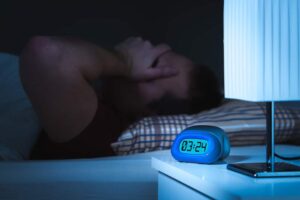For about 4 percent of American adults, nighttime is the right time to take a pill — a sleeping pill, that is. The Centers for Disease Control and Prevention says it’s relatively common for both adult men and women to lean on medications when sleep just won’t come.
But the same pills that should bring relief can also spark pain. Some types of sleeping pills can cause changes deep within your brain. When that happens, you could lose control over your use. And if you try to quit, you could get sick.
How Do Sleeping Pills Work?
There are literally dozens of pills you could take to help you sleep. Some people swear by melatonin, for example, while others stock up on over-the-counter antihistamines like Benadryl. But when we’re talking about pills with the potential for addiction and abuse, we’re referring to two types of prescription drugs.
Those two classes of drugs, say the American Sleep Association, include:
- Medications like Ativan, Halcion, and Restoril are in this class. They work by altering the brain chemical GABA. The pathway used by benzodiazepines is also used for the brain’s pleasure chemicals. That means some people feel euphoria on these pills.
- Selective gamma-aminobutyric acid medications. Medications like Lunesta and Sonata are in this class. They also work on the GABA pathway, but since they are selective, they have a smaller influence. They can spark euphoria in some people.
Both sets of medications can cause some side effects, including daytime sleepiness and inability to drive safely. Some drugs also cause people to do things, like eating or driving, while they’re asleep.

How Does Addiction Develop?
Few people pick up sleeping pills with the express purpose of abuse and euphoria. But these medications are remarkably easy to abuse, and many people make the choice to do so. In fact, Consumer Reports found that 40 percent of people with a prescription for sleep aids used the substances in troublesome ways.
Doctors have a checklist they use to diagnose an addiction to sleeping aids. To meet that experts say, you must have at least two symptoms such as:
- Adjusting your dose. You might take too much at once, or you might take the pills too close together.
- Inability to quit. You might want to cut back or reduce your intake, but you just can’t make it happen. You keep using them, even if they start to ruin your work or your relationships. You use them despite knowing it’s dangerous.
- Spending time on the habit. Your need to buy, use pills, and recover from them takes up a big chunk of your day. You have less time for work, friends, and family.
- You feel an urge to take pills, even if you don’t really want them.
- You need to take more pills to feel something that one pill once delivered.
- When you try to quit, you feel either physically or psychologically ill. You take more pills to keep those feelings away.

Treating a Sleeping Pill Addiction
Each dose of sleeping pills you take changes your brain in a small but meaningful way. All of those tiny tweaks add up, and in time, your brain can’t function properly without the drugs. A sudden, cold-turkey absence of drugs means an electrical firestorm in your brain, and that can make you really sick.
Researchers say doctors can use a cluster of medications to help you if you try a cold-turkey approach and feel bad. They can give you these drugs:
- Alpha agonists
- Beta blockers
- Anticonvulsants
- Antipsychotics
You’ll need that help because people going cold turkey often experience hallucinations, tremors, and seizures. It’s a life-threatening problem.
There is a better way.
Doctors can put you on a tapering schedule to help your brain adjust slowly to a lack of drugs. Experts say your taper will be:
- Tiny changes in your medication are easier for the brain to handle than big shifts.
- If you’re allowed to get medications when you need them, you could miss a treatment window before seizures begin.
- If you feel sick or ill during the process, they wait to lower your dose until you feel better.
Your doctor will probably switch you from the medication you’ve been abusing to one that lasts longer in your body and isn’t associated with a high on introduction. You can work together to find the one that’s right for you.
Since these medications are associated with such a difficult withdrawal period, it’s not wise to go through the process alone. Anyone thinking of quitting should talk to an expert, says the National Institute on Drug Abuse.
But know that your addiction won’t be cured after you’ve completed a taper. You still must understand the prompts that started this journey, and you will need to build skills to help you resist future temptations. That means you’ll need to enter a formal rehab treatment program, and you’ll need to stay in it for months until you’re stable in sobriety.
With hard work and dedication, you can get better. People do it every day. But you’ll need an expert’s help to get started.




